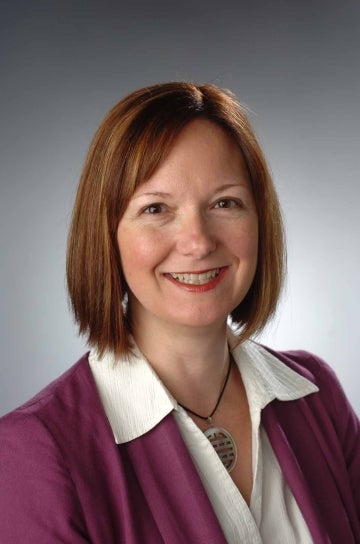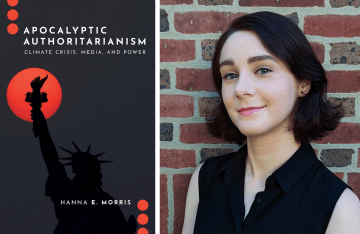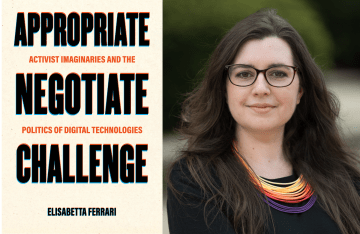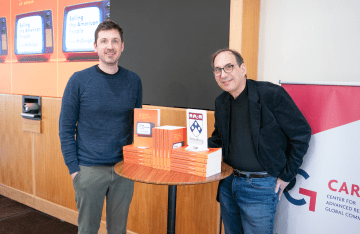Annenberg Alumna Jenny Stromer-Galley (Ph.D. ‘02) Studies Political Communication and Develops Apps for Intelligence Analysts
Stromer-Galley has been studying campaign messaging since she encountered Bob Dole’s website in 1996.

Seventy thousand tweets. That’s how many messages the 27 presidential candidates tweeted during the 2016 campaign. Annenberg alumna Jenny Stromer-Galley (Ph.D. ‘02) collected every single one of them.
Professor in the School of Information Studies at Syracuse University, Stromer-Galley has been analyzing the way political campaigns use online messaging with every presidential campaign since 1996. Her book Presidential Campaigning in the Internet Age (Oxford University Press) details her research.
Stromer-Galley and her team are evaluating the 2016 data, which includes Facebook and Twitter messages by the candidates and messages by the public about the candidates. One of their key findings thus far is that, contrary to popular opinion, Hillary Clinton used more attack messages on social media than Donald Trump did. Thanks to Stromer-Galley’s fellowship with the Tow Center for Digital Journalism, there’s a website that allows you to interact with the data.
“We developed algorithms to automatically categorize the messages we collected,” Stromer-Galley says. “You could choose to compare Bernie Sanders’ messages over time, or you could compare his messages to Hillary Clinton’s to see, for example, who posted more attack messages. Or you could select a date range and see all the messages posted during that period.”
Stromer-Galley is already gearing up to collect tweets and Facebook posts for the 2018 gubernatorial, House, and Senate elections. She is a big believer in open data, and she hopes to make that corpus available in a similar fashion.
President of the Association of Internet Researchers, Stromer-Galley was originally interested in social movements and early women’s rights rhetoric during her undergraduate work at the University of Minnesota. But in 1996, she “got distracted” by the election, finding Bob Dole’s campaign website fascinating. Convinced that the internet was going to change the way people communicated — and thus greatly impact social movements — she pivoted her research focus and wrote her master’s thesis, also at the University of Minnesota, on the rhetorical features of campaign websites. She has been studying online political campaign messaging ever since.

While pursuing her Ph.D. at Annenberg, Stromer-Galley worked on a grant project with Professor (and then-dean) Kathleen Hall Jamieson, studying gubernatorial elections in ten states. Two other graduate students — Kate Kenski (Ph.D. ‘06) and Rosa Martey (Ph.D. ‘06) — worked on the project as well. It was the beginning of a long and fruitful collaboration between Stromer-Galley, Kenski, and Martey.
Currently, the three scholars are co-principal investigators on an $11.5 million contract with the Intelligence Advanced Research Projects Activity (IARPA), an organization within the Office of the Director of National Intelligence responsible for leading research to address challenges facing the United States Intelligence Community. Stromer-Galley, Kenski, and Martey are tasked with developing an application that teaches users techniques for improving reasoning and decision-making in the intelligence community.
“Intelligence analysts are often dealing with incomplete or confusing information,” says Stromer-Galley. “We’re trying to develop an app that will help them learn how to overcome their natural cognitive biases when analyzing information. We want to reduce the chance that they’ll make an error when analyzing important information, like documents associated with the Russia election tampering probe.”
Stromer-Galley, Director of the Center for Computational and Data Sciences in the School of Information Studies at Syracuse University, says that common cognitive biases are usually helpful to humans because they allow us to engage in cognitive shortcuts that reduce the time it takes to understand information. However, in the case of intelligence analysis, these same biases can cause trouble if they allow analysts to ignore certain information.
This is Stromer-Galley’s fourth IARPA project. Also a collaboration with Kenski and Martey, and another Annenberg alumna Adrienne Shaw (Ph.D. ’10), the previous project involved building educational games to improve people’s reasoning abilities. Their game outperformed a training video developed by the U.S. government.
“I’ve always had an interest in decision-making,” Stromer-Galley says, “so working on IARPA projects is a natural fit. I really love that we get to bring what we know from academic research and use it to solve real world problems. We have the opportunity to really make a difference.”



